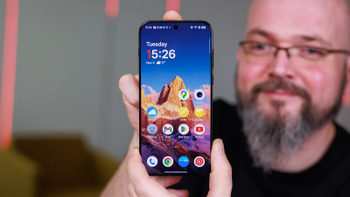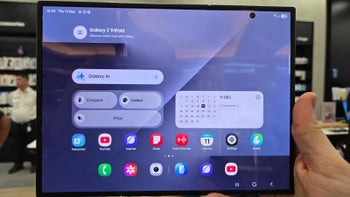Meta Ray-Bans can expose strangers' personal information with AI-powered doxing
We may earn a commission if you make a purchase from the links on this page.

While governments and government agencies all around the world have been using facial recognition technologies for who knows how long – and that's a concern on its own – things are headed straight to the nightmare genre.
See (pun intended), it's possible to engage in the "wonderful" doxing activity just with a pair of Meta's Ray-Ban smart glasses, and a minimal amount of coding.
A Harvard duo did so, as The Register tells their story – however, keep in mind that the creation is more of a "wake-up call", as the students explain. They want the world to take privacy more seriously, now that we're in the AI era.
Top 3 early Prime Big Deals you should check out:
So, meet AnhPhu Nguyen and Caine Ardayfio. They've collaborated previously on "some positively explosive projects", but now have something astounding at their hands.
Meta's new Ray-Ban smart glasses, equipped with a camera, can attempt to quickly and automatically identify anyone captured by the camera and generate an AI-created profile – a dossier, if you like – on them.
A Harvard duo did so, as The Register tells their story – however, keep in mind that the creation is more of a "wake-up call", as the students explain. They want the world to take privacy more seriously, now that we're in the AI era.
Meta's new Ray-Ban smart glasses, equipped with a camera, can attempt to quickly and automatically identify anyone captured by the camera and generate an AI-created profile – a dossier, if you like – on them.
Are we ready for a world where our data is exposed at a glance? @CaineArdayfio and I offer an answer to protect yourself here:https://t.co/LhxModhDpk pic.twitter.com/Oo35TxBNtD
— AnhPhu Nguyen (@AnhPhuNguyen1) September 30, 2024
This experimental project, named "I-XRAY" by its creators Nguyen and Ardayfio, uses Meta glasses to stream video to Instagram. The faces detected in the livestream are analyzed by services like PimEyes, which match the images with publicly available ones and return related URLs.
With just a name, I-XRAY can then cross-check this information using people-search websites, potentially uncovering addresses and even partial Social Security numbers by compiling fragments from different sources.
The technical process, developed by Nguyen and Ardayfio in Python, sends the summarized results from an AI model to a mobile app built in JavaScript, offering a mini-biography on anyone in front of the camera. However, the app isn’t instant, with Ardayfio admitting it typically takes around a minute to retrieve the information.
All the data gathered by I-XRAY comes from public sources, raising concerns about its potential misuse as an open-source intelligence tool that could infringe on privacy.
Someone could easily use a high-zoom camera to discreetly take a picture from a distance. Modern cameras are capable of up to 50x zoom, making them perfect for such use.
Any camera – whether hidden or not – could perform the same task, the developers pointed out. The code itself didn’t require much expertise: Nguyen recalled it took only two or three days of coding, with around four to six hours of work per day, to complete the project.
Despite their success, the duo has no intention of sharing their code due to its potential for misuse. They also noted that the project was just a side experiment and not intended for public release.
Ardayfio explained that while the technology behind the project functions, it is somewhat slow and not entirely accurate. He emphasized that the primary goal of the project was to showcase what could be accomplished with common technology and to raise awareness about the importance of data privacy.
Ardayfio pointed out that although bad actors are already familiar with how to exploit such tools, the project aimed to help the general public become more informed about protecting their personal information.
Although Nguyen has three years of coding experience and Ardayfio has nine, they insisted that advanced skills weren't necessary. According to Nguyen, "Anyone familiar with basic web automation tools like ChatGPT could create this".
He expressed amazement that such a system could be built so quickly, even by a novice developer. Yeah, personally, I'm also "amazed".
The technical process, developed by Nguyen and Ardayfio in Python, sends the summarized results from an AI model to a mobile app built in JavaScript, offering a mini-biography on anyone in front of the camera. However, the app isn’t instant, with Ardayfio admitting it typically takes around a minute to retrieve the information.
All the data gathered by I-XRAY comes from public sources, raising concerns about its potential misuse as an open-source intelligence tool that could infringe on privacy.
The choice to use smart glasses for this project was more for style than practicality, according to Nguyen, who explained via email that the glasses were selected to attract attention. In reality, he argued, the risk posed by this kind of tool is not dependent on smart glasses.
Someone could easily use a high-zoom camera to discreetly take a picture from a distance. Modern cameras are capable of up to 50x zoom, making them perfect for such use.
Any camera – whether hidden or not – could perform the same task, the developers pointed out. The code itself didn’t require much expertise: Nguyen recalled it took only two or three days of coding, with around four to six hours of work per day, to complete the project.
Ardayfio explained that while the technology behind the project functions, it is somewhat slow and not entirely accurate. He emphasized that the primary goal of the project was to showcase what could be accomplished with common technology and to raise awareness about the importance of data privacy.
Ardayfio pointed out that although bad actors are already familiar with how to exploit such tools, the project aimed to help the general public become more informed about protecting their personal information.
He expressed amazement that such a system could be built so quickly, even by a novice developer. Yeah, personally, I'm also "amazed".
Follow us on Google News









![A new Android bug is making it impossible to install new apps. Are you affected? [UPDATE]](https://m-cdn.phonearena.com/images/article/176703-wide-two_350/A-new-Android-bug-is-making-it-impossible-to-install-new-apps.-Are-you-affected-UPDATE.webp)



Things that are NOT allowed:
To help keep our community safe and free from spam, we apply temporary limits to newly created accounts: